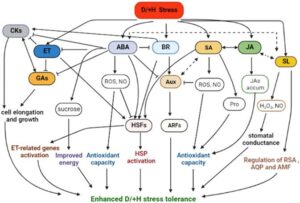Back to: Botany 400 Level
Hello my Afrilearn champion! It’s so good to have you back again. You’ve been going strong with these advanced plant topics, and honestly, I’m very proud of how far you’ve come. Today, we’re talking about something that’s powerful, practical, and deeply rooted in African traditions too—engineering secondary metabolites like alkaloids and flavonoids. Let’s get into it together, as always—simple and relatable.
Engineering secondary metabolites (e.g., alkaloids, flavonoids)
Have you ever wondered why some plants like bitter leaf or neem are used as medicine in Nigerian homes? Or why onions and oranges are said to “clean the blood”? That’s because these plants produce special chemicals called secondary metabolites.

Unlike carbohydrates and proteins that all plants need to survive, these secondary metabolites are like bonus features—they help plants defend themselves, attract pollinators, or survive stress. But even better, they are useful to us as humans—in medicine, food, cosmetics, and even agriculture.
Now, imagine if we could engineer these compounds—make plants produce more of them, or even make new ones? That’s exactly what this lesson is about!
What Are Secondary Metabolites?
Secondary metabolites are organic compounds not directly involved in the normal growth, development, or reproduction of plants, but they perform very important roles. They include:
- Alkaloids – Found in plants like bitter kola and tobacco; used in drugs like quinine for malaria.
- Flavonoids – Found in fruits like oranges and leafy vegetables; they help in fighting diseases and boosting immunity.
- Terpenoids, phenolics, tannins, etc. – All help in plant defence and have health benefits.
Why Engineer These Compounds?
- Medicinal Use: Many modern drugs come from plant metabolites. Engineering them means we can:
- Increase production of valuable compounds like morphine or artemisinin (for malaria).
- Reduce dependency on wild plant sources, protecting biodiversity.
- Increase production of valuable compounds like morphine or artemisinin (for malaria).
- Agricultural Benefits:
- Some metabolites act as natural pesticides.
- Engineered plants can resist pests and diseases without chemicals.
- Some metabolites act as natural pesticides.
- Economic Value:
- Plants with high-value compounds can boost income for farmers and herbal product makers in Nigeria and Africa.
- Plants with high-value compounds can boost income for farmers and herbal product makers in Nigeria and Africa.
How Do We Engineer Them?
- Genetic Engineering:
Scientists insert specific genes that control the production of desired compounds. For example:
- A gene from one plant can be added to another to increase alkaloid content.
- A gene from one plant can be added to another to increase alkaloid content.
- Pathway Modification:
Enzymes that produce flavonoids can be boosted or redirected to make more potent or different types of flavonoids.
- Tissue Culture with Precursors:
Plant cells are grown in labs with added nutrients or chemicals to increase secondary metabolite production—this is useful for pharmaceutical industries.

Let’s take bitter kola (Garcinia kola)—used in Nigeria for sore throat, cough, and more. Scientists can identify the gene responsible for its bitter alkaloid, clone it, and use biotechnology to make other plants or even microbes produce that same compound at a large scale.
This makes the product more available, cheaper, and saves our forests from over-harvesting bitter kola trees.
Summary
- Secondary metabolites are special plant chemicals like alkaloids and flavonoids that help plants survive and benefit humans.
- They are used in medicine, agriculture, and nutrition.
- Engineering these compounds increases their availability and effectiveness.
- Methods include genetic engineering, enzyme pathway manipulation, and tissue culture.
Evaluation
- What are secondary metabolites, and why are they important?
- Name two examples of secondary metabolites and their uses.
- Describe one way scientists engineer these metabolites in plants.
Seriously, you’re learning the kind of science that saves lives, boosts economies, and protects the planet. Don’t stop now—your brilliance is what Africa needs to innovate and lead the world in plant science. Keep pushing, keep learning, and as always, Afrilearn is right here by your side. On to the next lesson, champ!
